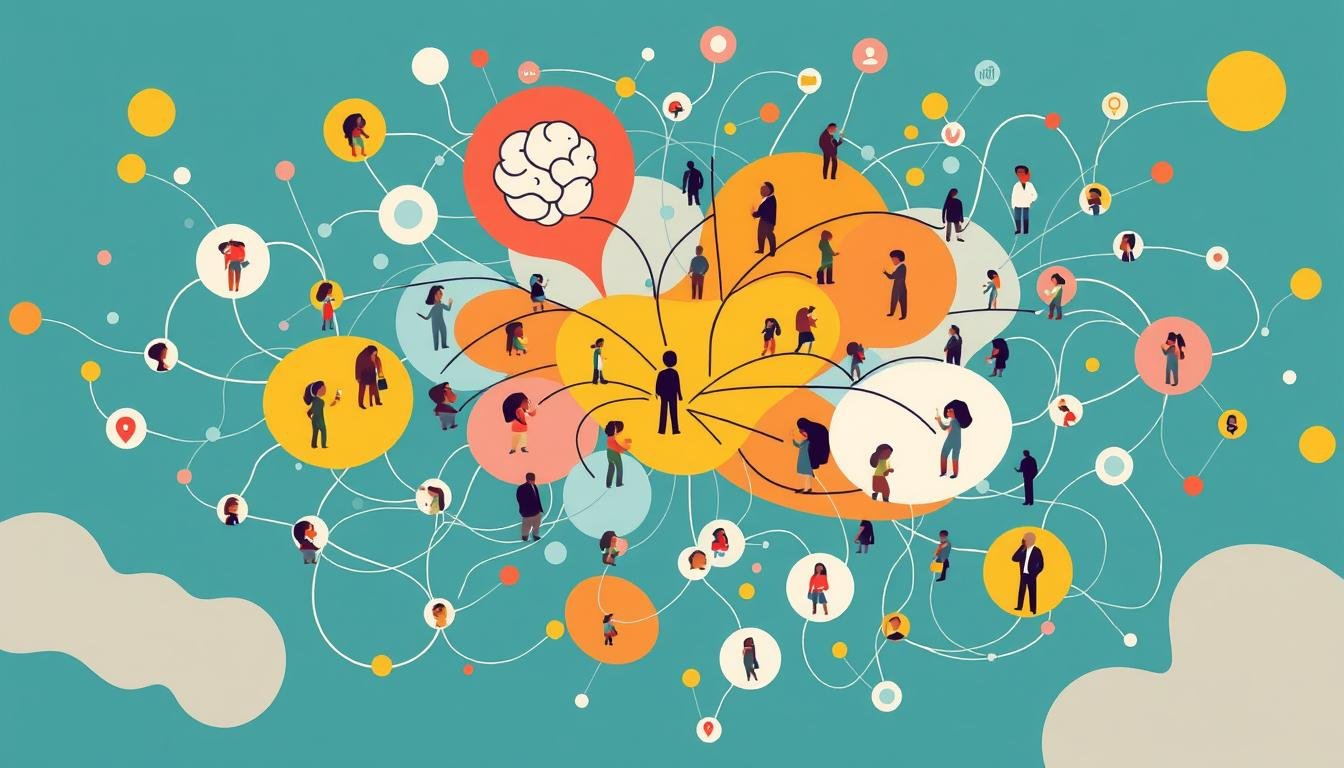Psychological Foundations of Professional Networking
The world of psychology is all about connections. Professional networking is key in this field, shaping careers and advancing knowledge. Understanding the psychological side of networking can change how we interact.
Networking psychology is more than just exchanging information. It’s about creating meaningful relationships that help both sides. For psychologists, good networking opens new doors, keeps them updated, and keeps their practice current.
The social psychology of networking shows us interesting facts. Did you know first impressions are made in seconds? This shows how critical those first meetings are. Trust is also key. Being consistent builds trust, which is the foundation of strong professional ties.
Emotional intelligence (EQ) is another important factor in networking success. High EQ lets professionals understand and manage emotions, leading to deeper connections. It’s not just about knowing stuff, but also about connecting with others.
Key Takeaways
- First impressions form rapidly, emphasizing the importance of initial encounters
- Trust is crucial in relationship building, fostered by consistent behavior
- Emotional intelligence leads to deeper professional connections
- Many professionals experience anxiety in networking situations
- Social proof influences behavior in networking environments
- Authenticity is essential, balancing professionalism with genuine engagement
- Successful networking requires nurturing relationships over time
Understanding the Psychology Behind Professional Connections
Professional networking is all about human behavior and psychology. Knowing these basics can really help you make strong connections. Let’s look at what makes our professional relationships work.
The Role of Human Behavior in Networking
Human behavior is key to networking success. Studies show that skills like communication are more important than technical skills in many jobs. For example, saying “because” after a request can make people more likely to agree by 33%.
Social Psychology Principles in Professional Settings
Social psychology helps us understand networking better. It shows that people are more likely to follow someone who looks professional. This shows how important our actions and appearance are in building relationships.
Cognitive Aspects of Relationship Building
Good networking means knowing how our brains work. Sending “give” emails every now and then is more effective than always asking for things. This fits with how we like to build relationships slowly.
| Networking Principle | Impact on Connections |
|---|---|
| Reciprocity | Increases likelihood of mutual support |
| Similarity | Enhances understanding and liking |
| Consistency | Builds trust over time |
| Appreciation | Strengthens professional bonds |
Successful networking on sites like LinkedIn is about being real, giving, and returning favors. By using these psychological tips, you can make lasting professional connections and open up new career doors.
The Science of First Impressions in Networking
First impressions are key in professional networking. Studies reveal we judge others in milliseconds. These quick judgments often rely on body language and looks, not words.
Good first impressions can lead to great opportunities. Bad ones, however, can block building relationships. These early interactions shape our future collaborations and professional ties.
Body language is crucial in making first impressions. Non-verbal signs like eye contact and posture tell a lot before you speak. Getting these right can boost your networking success.
“You never get a second chance to make a first impression.” – Will Rogers
Being real in your communication is vital for lasting connections. It’s okay to show your best side, but being true builds trust. This honesty is the base for deep professional bonds.
- Make eye contact to show engagement
- Use open body posture to appear approachable
- Smile genuinely to create a positive atmosphere
- Listen actively to demonstrate interest
First impressions in networking can change. With effort and real interactions, you can improve and form strong professional ties over time.
Emotional Intelligence: The Cornerstone of Effective Networking
Emotional Intelligence is key in professional networking. It helps us understand and manage our and others’ feelings. This skill is vital for strong relationships and better communication.
Self-Awareness in Professional Interactions
Self-awareness is at the heart of emotional intelligence. It means knowing your feelings, strengths, and weaknesses. By thinking about how you react in networking, you can grow your self-awareness and social skills.
Reading and Responding to Social Cues
Good networkers are great at reading social cues. They notice nonverbal signs and change their approach. Listening well helps them understand others and build empathy, creating deeper connections.
Managing Emotional Responses in Networking Situations
Keeping calm in tough networking situations is important. Mindfulness helps you manage your emotions and stay focused in talks.
| EI Component | Networking Application |
|---|---|
| Self-Awareness | Recognizing personal strengths and weaknesses in social settings |
| Self-Regulation | Controlling reactions in high-pressure networking events |
| Empathy | Understanding and relating to others’ perspectives |
| Social Skills | Building and maintaining professional relationships |
Improving these emotional intelligence skills will help you in networking. You’ll build real relationships and grow in your career.
Trust Building and Authenticity in Professional Relationships
Trust is key to strong professional ties. It’s more than just exchanging cards or profiles. Real connections come from genuine talks and shared moments.
Quality matters more than quantity in networking. Aim for deep connections, not just a long list of contacts. This way, you build relationships that truly matter.
Listening well is vital in building relationships. When you really listen, you show respect and build trust. It helps you understand others and find common ground.
Make your interactions personal. Tailor your messages to each person. Remember their work or interests. This shows you care about the relationship.
“Authenticity is the alignment of head, mouth, heart, and feet – thinking, saying, feeling, and doing the same thing – consistently. This builds trust, and followers love leaders they can trust.” – Lance Secretan
Value diversity in your network. Connect with people from different backgrounds and fields. This broadens your view and opens new doors.
| Authentic Networking Practices | Benefits |
|---|---|
| Active Listening | Builds trust and understanding |
| Personalized Communication | Strengthens individual connections |
| Embracing Diversity | Expands opportunities and perspectives |
| Offering Help Without Expectations | Cultivates goodwill and reciprocity |
Building real relationships takes time. It’s a journey that needs patience and a true interest in others. Focus on trust and genuine communication to build a network that supports your career for years.
Psychological Foundations of Professional Networking
Networking psychology is key to building strong professional relationships. Knowing the basics of social psychology of networking can boost your career. It helps you connect better with others.
Core Psychological Principles
Effective networking starts with understanding key behavioral psychology ideas. Social proof, for example, shapes how we start conversations and form relationships. By watching others, we learn what works well.
Social Proof and Influence
Social proof is a big deal in networking psychology. Seeing others confident at events or on LinkedIn makes us feel the same way. It helps us get past our fears and dive into networking.
Behavioral Psychology in Networking
Knowing behavioral psychology can change how you network. The principle of reciprocity, for instance, shows that people like to return favors. In networking, this means helping others, which often leads to them helping you back.
“Networking is not about just connecting people. It’s about connecting people with people, people with ideas, and people with opportunities.” – Michele Jennae
Using these psychological principles can really help your networking. Remember, it’s better to have a few good connections than many weak ones. Aim for real relationships that help your career. With 65-80% of jobs found through networking, learning these principles is crucial for success.
Overcoming Networking Anxiety and Social Barriers
Many professionals struggle with networking anxiety, making it hard to connect with others. Understanding this issue is the first step to beating it. Social barriers often come from fear of being judged, especially in work settings.
Understanding Social Anxiety in Professional Settings
Social anxiety disorder is common, even among top professionals. It’s the fear of being judged in social situations, which can hold back career growth. It’s important to recognize these feelings to tackle them.
Practical Coping Strategies
To beat networking anxiety, start with small steps. Go to minor events to build connections slowly. Virtual networking is great for those who feel more comfortable online. Listening well helps build real relationships and lowers self-doubt.
- Research attendees beforehand to find conversation starters
- Use positive affirmations to boost confidence
- Practice deep breathing and mindfulness to stay grounded
- Leverage technology platforms like LinkedIn for initial connections
Building Confidence Through Practice
Building confidence takes time and effort. Try role-playing to improve your networking skills and feel less anxious. Use visualization and mental rehearsals to prepare for events. Joining workshops or online groups offers more support and ways to cope.
“Starting with smaller networking events can lead to deeper and more meaningful connections.”
By using these strategies and keeping at it, professionals can turn networking from a source of worry into a chance for growth and success.
Strategic Networking: Psychology of Long-term Relationship Building
Strategic networking is more than just collecting business cards. It’s about making lasting connections that grow over time. Successful networkers aim for quality over quantity, building a strong web of professional ties.
Good networking takes effort and care. After meeting someone, send a personalized message. Stay active on platforms like LinkedIn to keep your network engaged. Regular check-ins help strengthen bonds and show you care about their success.
The principle of reciprocity is key in building long-term relationships. Helping others or sharing valuable insights can lead to support in return. This mutual benefit builds a strong base for lasting professional connections.
“Networking is not about just connecting people. It’s about connecting people with people, people with ideas, and people with opportunities.” – Michele Jennae
To build a strong network, consider these tips:
- Attend industry events and trade shows regularly
- Engage in online communities related to your field
- Offer mentorship or seek out mentors
- Share relevant content and insights with your network
- Be authentic and show genuine interest in others
Remember, strategic networking is a long-term investment in your career. By focusing on building real relationships, you’ll create a powerful network. This network will support your career goals and open doors to new opportunities.
The Impact of Digital Psychology on Modern Networking
Digital psychology has changed how we connect at work. Today, 97% of teens use the Internet, and 77% have online profiles. This makes the digital world key for networking.
This change brings new chances to make professional connections and grow our networks.
Online Relationship Building
Studies show a strong link between social media use and growing social connections. A study by Liu et al. found that social media boosts both bonding and bridging social capital. This shows how powerful online networking can be for making real professional connections.
Virtual Networking Psychology
The psychology of virtual networking is intricate. Over half of Facebook users are under 18, and 95% of US teens have smartphones. Knowing how young professionals use the Internet is crucial for good virtual networking.
Digital Communication Dynamics
Digital communication has its own rules. With 25% of American adults always online, personal and work networking mix. This constant connection brings both challenges and chances in online networking. It needs a deep understanding of digital psychology for success.
Source Links
- Professional Networking For Psychologists
- Master Networking Psychology | Eventflare: Build Authentic Connections
- The Psychology of Entrepreneurial Networking: Building Meaningful Connections for Business Success.
- Networking Tips For Scientists – The Social Psychology Tips
- Mastering the Art of LinkedIn Networking Unveiling the Psychology Behind Building a Strong Network
- First impressions – (Business Networking) – Vocab, Definition, Explanations | Fiveable
- The Power of First Impressions in Networking
- The Science Of First Impressions | Gravitas
- Jobya Learning Center – Networking and Relationship Building – The Role of Emotional Intelligence in Networking Success
- Here’s how you can use emotional intelligence in networking for conflict resolution professionals.
- Networking That Works: Building Authentic Connections
- Jobya Learning Center – Networking and Relationship Building – The Importance of Authenticity in Networking Relationships
- Building a professional network online: How to connect with your peers and working professionals in a virtual environment
- Networking Basics — Career Advice | Career Key
- Connecting Minds The Psychology of LinkedIn Networking
- Networking with Confidence: Overcoming Social Anxiety in Professional Settings – Operacy
- Unlocking Success: Mastering the Art of Networking and Relationship-Building
- Top 10 Books on Networking
- Networking and Social Capital: Building Relationships for Success
- The bright side of social network sites: On the potential of online social capital for mental health
- intro-masters-final
- The “online brain”: how the Internet may be changing our cognition








